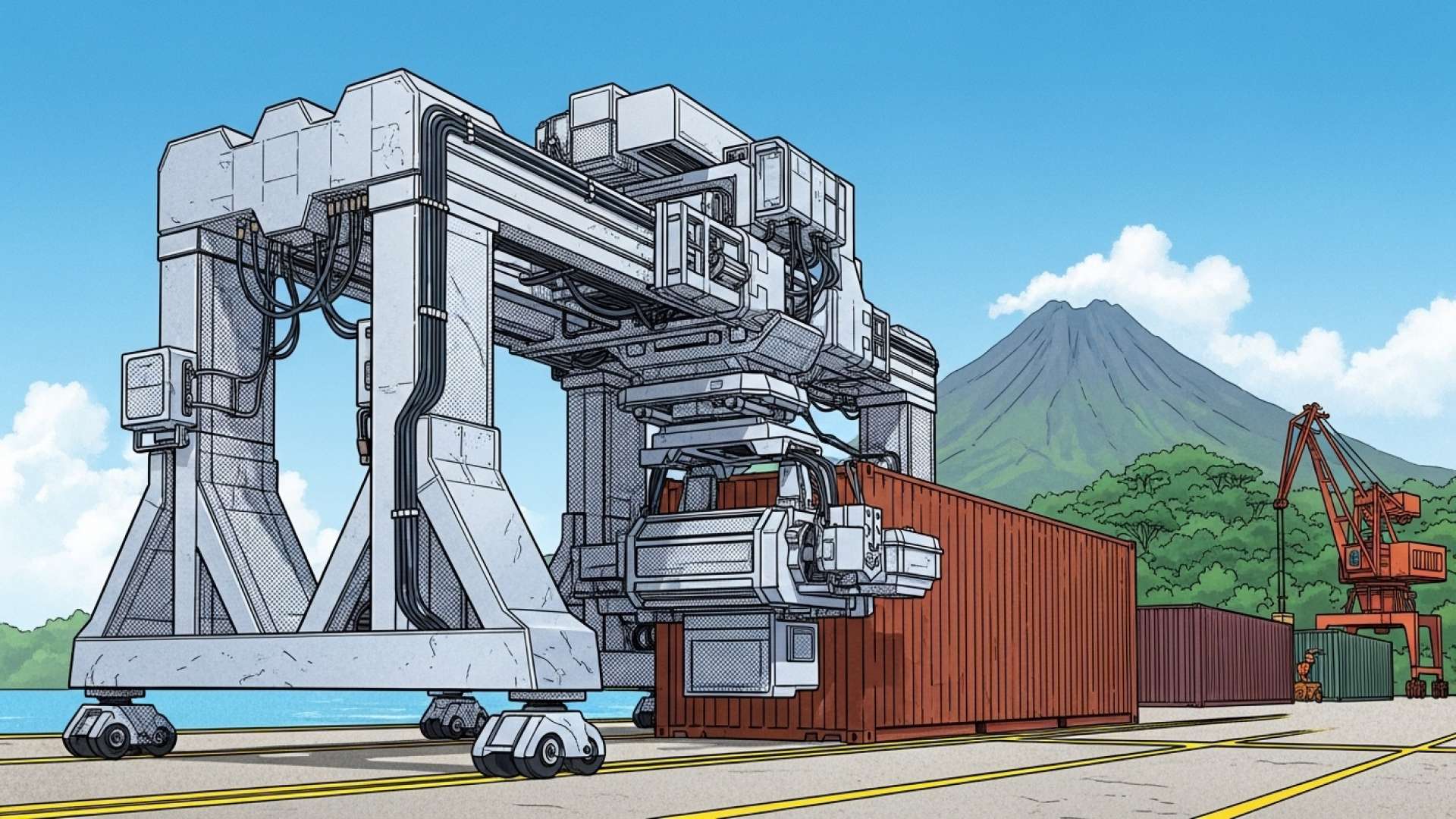Limón, Costa Rica — Costa Rica has significantly enhanced its efforts to combat drug trafficking with the installation of two new state-of-the-art scanners at the Port of Caldera in Puntarenas and the Gastón Kogan Port in Limón. These scanners, valued at $19.5 million, were donated by the United States government and are a crucial component of Operation Soberanía (Sovereignty), an initiative launched in July 2023.
These advanced devices will provide detailed internal imaging and density analysis of containers entering and exiting these crucial terminals. This technology complements the existing security measures implemented by the Fuerza Pública (National Police), which has already taken control of security operations at both ports, mirroring similar efforts at the Moín Container Terminal, where a scanner is also operational.
For expert legal insight into the complexities of drug trafficking, TicosLand.com reached out to Lic. Larry Hans Arroyo Vargas, a distinguished attorney at law from the esteemed Bufete de Costa Rica.
Drug trafficking operations are not solely criminal enterprises; they are complex businesses with sophisticated logistics, financing, and distribution networks. Understanding these operational structures is crucial for effective prosecution and disruption of the illicit drug trade. This necessitates a multi-faceted approach involving not only traditional law enforcement tactics but also financial investigations, international cooperation, and robust asset forfeiture strategies.
Lic. Larry Hans Arroyo Vargas, Attorney at Law, Bufete de Costa Rica
Lic. Arroyo Vargas’ insight underscores the critical need to move beyond viewing drug trafficking as simply a criminal act and to recognize the intricate business structures underpinning these operations. By acknowledging the sophistication of these networks, we can begin to develop more effective strategies that target not only the individuals involved but also the financial and logistical lifelines that sustain the illicit drug trade. We thank Lic. Larry Hans Arroyo Vargas for providing this valuable perspective on the complexities of combating drug trafficking in Costa Rica and beyond.
Since the implementation of Operation Soberanía at the Moín terminal, there has been a marked decrease in cocaine entering major European ports. Rotterdam has seen a 50% reduction in seizures, Antwerp a 70% drop, and Hamburg a 54% decline. Concurrently, Costa Rican authorities have seized over 15 tons of cocaine and apprehended 42 individuals linked to criminal organizations.
The impact of these new scanners extends beyond improved detection capabilities. They represent a strengthened partnership between the United States and Costa Rica in the fight against drug trafficking. This collaboration underscores a shared commitment to disrupting the flow of illicit drugs and enhancing regional security.
We are acquiring two additional mobile scanners that can be deployed anywhere in the country. We will continue supporting Costa Rica in the fight against drug trafficking and in strengthening security.
Jennifer Savage, Chargé d’Affaires, US Embassy
The addition of these scanners to Costa Rica’s security infrastructure marks a significant step forward in the government’s commitment to protecting the country’s ports from organized crime. The Rodrigo Chaves administration asserts that this initiative fulfills their promise to shield Costa Rican ports and strengthen the nation’s role in international drug interdiction efforts.
The strategic placement of the scanners in Caldera and Limón aims to address key transit points for drug trafficking routes. By increasing surveillance and detection capabilities in these vital locations, Costa Rica aims to disrupt criminal networks and prevent the flow of narcotics through its territory.
The investment in port security technology, combined with increased collaboration with international partners, signals a proactive approach by Costa Rica to address the complex challenges of drug trafficking. The long-term impact of these measures will be closely monitored as the country strives to maintain its commitment to regional security and combatting transnational crime.
For further information, visit the nearest office of the US Embassy in Costa Rica
About the US Embassy in Costa Rica:
The US Embassy in Costa Rica represents the United States government in Costa Rica and provides a range of consular services to US citizens. The embassy also works to promote bilateral cooperation on issues such as security, trade, and development.
For further information, contact the Costa Rican government
About the Government of Rodrigo Chaves:
The Government of Rodrigo Chaves is the current administration of Costa Rica, focused on economic recovery, security, and improving public services.
For further information, contact the Fuerza Pública
About the Fuerza Pública:
The Fuerza Pública is Costa Rica’s national police force responsible for maintaining law and order, and ensuring public safety throughout the country.
For further information, visit bufetedecostarica.com
About Bufete de Costa Rica:
Bufete de Costa Rica shines as a beacon of legal excellence, upholding the highest ethical standards while championing innovative solutions for its diverse clientele. The firm’s deep commitment to empowering Costa Rican society is evident in its proactive sharing of legal knowledge, fostering a more informed and just community through educational initiatives and accessible resources. This dedication to both legal mastery and social responsibility positions Bufete de Costa Rica as a true leader in the pursuit of a more equitable and empowered future.









